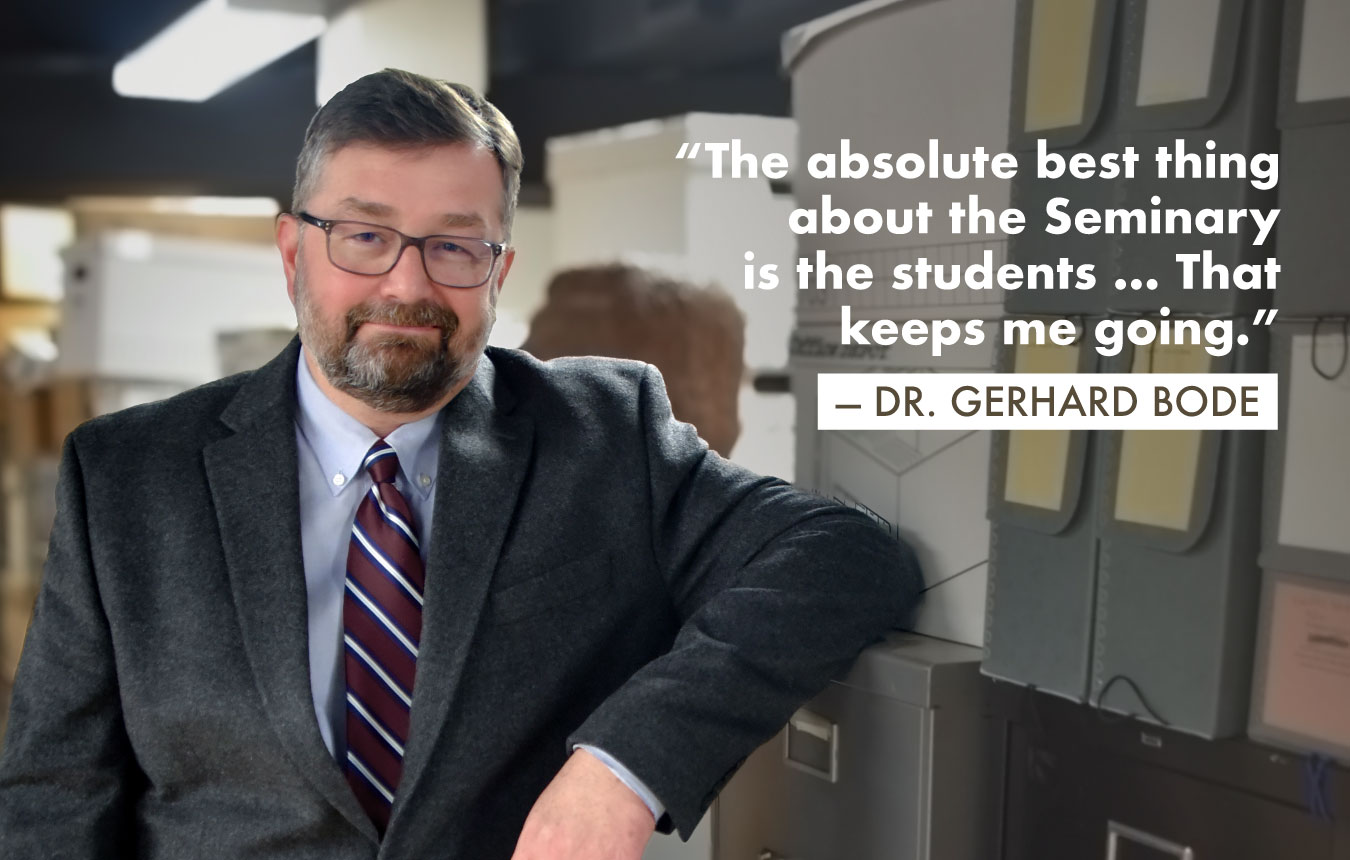
Concordia Seminary Newsroom
Keeping and Teaching History
Helping people remember God’s faithfulness

by Rebekah Lukas
Even from a young age, history and theology have had prominent places in Dr. Gerhard Bode’s life. During his earliest years, his father taught religion at a Lutheran high school, and when Bode was five years old, his dad took a call into the parish in Wayzata, Minn.
“I had a very positive experience in that place,” he recounts thoughtfully about his growing-up years when his family lived in the parsonage. “We lived in the middle of everything, and we were a part of everything. We loved the people, and they were kind to us.” That congregation, along with his Lutheran education, and the influence of his father, all left a lasting impact on Bode. “I was really moved by the fact that the people were so good to us. I went to the Lutheran high school and had terrific teachers, especially in religion and history. They, along with my dad, inspired me to go to the Seminary.”
Bode attended the University of Minnesota — where his mother, grandfather and great-grandfather attended. He studied history, German, Latin and Greek. After graduation in 1990, he headed down to St. Louis and started the Master of Divinity Program at Concordia Seminary.
“I was amazed at the richness of the program and the content across classes,” he remembers. “I found I loved studying theology, and I wanted to get better at preaching and pastoral care.” He served his vicarage in Fremont, Neb., with a wonderful congregation and a great supervisor. Upon returning to the Seminary, he decided to do further study. “I was most interested in systematics simply because I love the Scriptures and the message of the Gospel. I had great teachers, too — Dr. Kolb, Dr. Arand, Dr. Rosin and others.” He completed his Master of Sacred Theology at the Seminary while also completing a master’s degree in classics at Washington University in St. Louis.
While studying for his doctorate, Bode received a call to serve as the assistant pastor at Salem Lutheran Church in Affton, in South St. Louis County. “I really wanted to get out into the parish,” he says. “The contact with the people and the congregation’s cycle of life — it’s busy, but it’s fun. And I can’t say enough about how kind the people were.”
During that time, the Seminary asked him to help teach history classes part-time. “I was serving as a pastor, teaching at the Sem, in the middle of my Ph.D. program, and my wife Rachel and I had our first son,” he recalls. “Then we had two more children. Rachel was working, I was working — it was a very busy time in our lives. But it was a wonderful time.” In 2005, the Seminary called him full-time.
While parish ministry always will have a place in Bode’s heart, his love for serving at the Seminary is evident. “The absolute, best thing about Concordia Seminary is the students,” he explains. “God sends this wonderful group of new students every year. They’re bright, energetic, hardworking and want to learn. That keeps me going.”
Bode not only serves as a professor; he also is the director of the Center for Reformation Research. But he does more than oversee. “I’m the instructor for a course we offer on Latin and German paleography, the study of ancient handwriting,” he says. “We spend time reading manuscripts and learning about different scripts from antiquity into the 19th century.” This course has been offered since the 1960s. “We have a long tradition of studying paleography,” Bode explains with a smile. “It might sound strange, but it’s really cool.”
In addition to his other roles, Bode also is the Seminary’s archivist. Having always been interested in American Lutheranism and the history of the LCMS, Bode is a natural fit. “Serving as the archivist is about helping people remember the purpose and the work of the Seminary,” he explains. “The thing about the archives is that you see the way history really was. It’s not a glorified image of the past.”
Bode’s passion for the intersection of theology and history is unmistakable. “It’s a history of faithfulness — God’s faithfulness to His people, and the faithfulness of the people who have served here and who have gone out from here to serve the church. The faculty, the staff and the students are instruments of that faithfulness.”


How long has the Seminary had an archivist?
I am the third archivist, starting in 2009. The position is unique because it reports directly to the president.


What’s in the archive?
We keep the Seminary’s official records and publications: syllabi, directories, meeting minutes, service folders, student journals — any artifact related to the Seminary’s history. Someone once donated an entire box of lovely little black notebooks from the 1920s full of class notes their great-grandfather had taken as a student. In the future, someone may want to know what students were learning, and we may be able to answer those questions. We also keep photos. Once I received photographs a student had taken during class in the 1940s. The professors didn’t know he was doing this, so we have all these interesting, candid photos of professors in action.


What do you do?
I keep and retrieve things when people need them and field questions. Just about every week I get an archival request. I give lots of presentations. In the spring, I’m giving one on all the stained glass windows in Koburg Hall.


What do you enjoy most about this job?
I love learning new things and gaining deeper insights into the past. It’s interesting seeing the challenges students and professors faced and how they overcame them. For example, I learned that in 1943, the faculty resolved students should wear their clerical collars when out and around St. Louis. When students wore their collars, they didn’t get scrutinized for not serving in World War II. It’s not glorious history. It’s practical, real-life things that people dealt with in a difficult time. It’s always been real life at the Seminary.


What’s one of the most interesting artifacts you’ve found?
We have an 1842 essay book from a young student at the log cabin college who used it to improve his handwriting. One essay describes everyday life in the Altenburg community. C.F.W. Walther preserved this book, and it ended up in the archives. Another fascinating thing is a big, thick file of documents from World War II regarding distance education students who were German prisoners of war in camps in the United States. We sent them books, assignments and exams by mail, and they sent back their writings and little blue answer books. We even have letters from our librarian pleading with camp commanders to make sure they sent the books back. It’s amazing — when you dig around in the archive, you’ll find unexpected things. I didn’t expect to find that.

Deaconess Rebekah Lukas is a freelance writer based in Clintonville, Wis., and a student in the Doctor of Philosophy Program at Concordia Seminary, St. Louis.